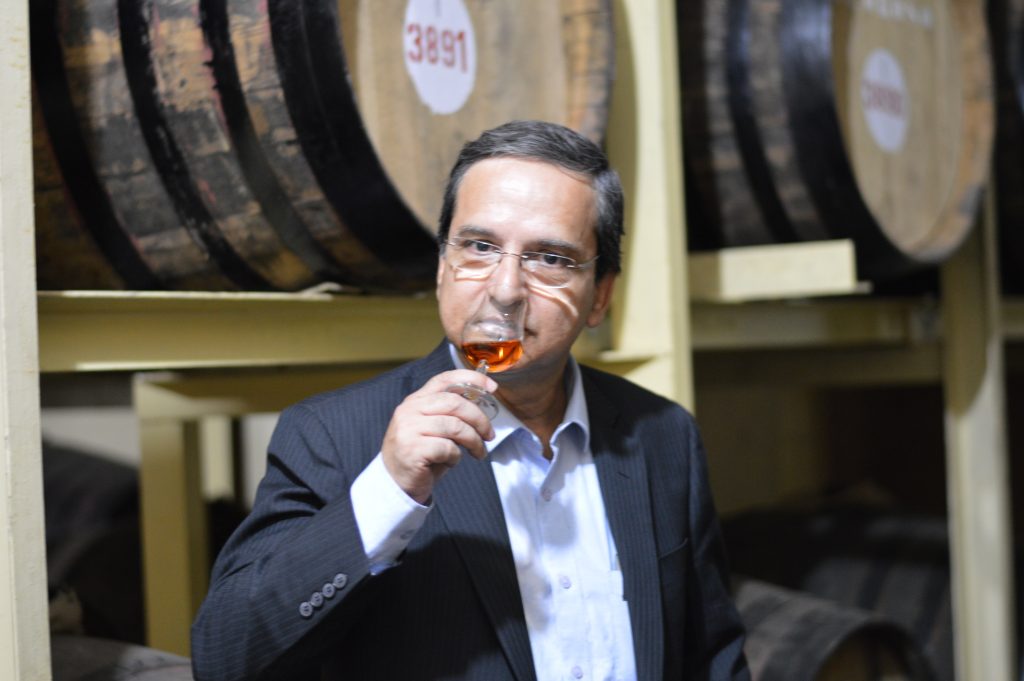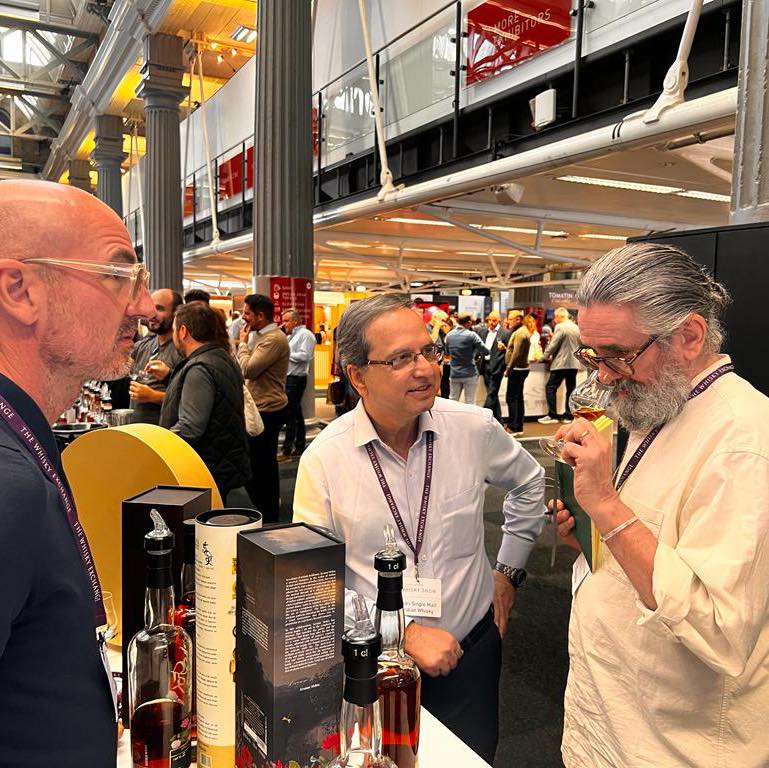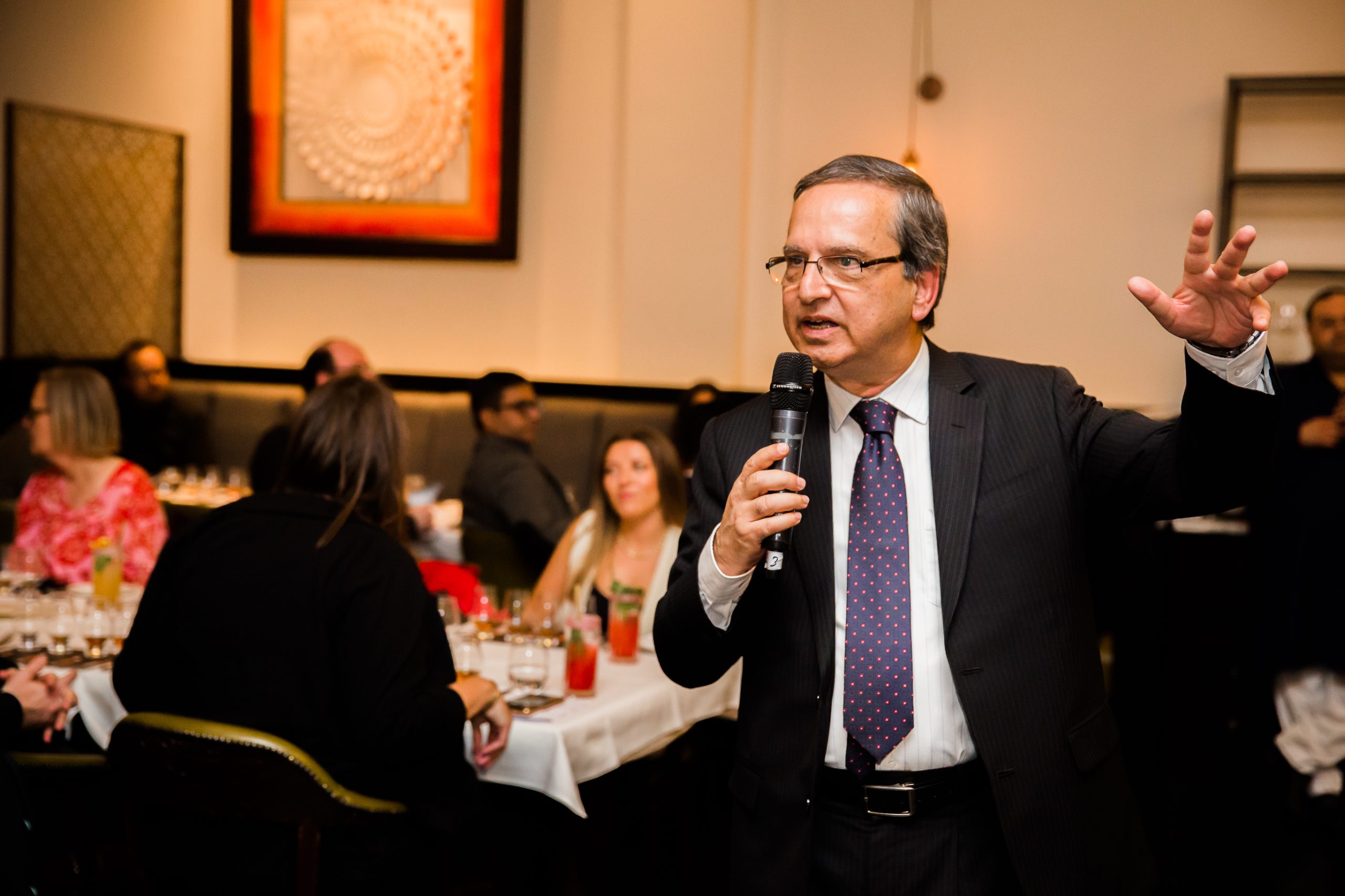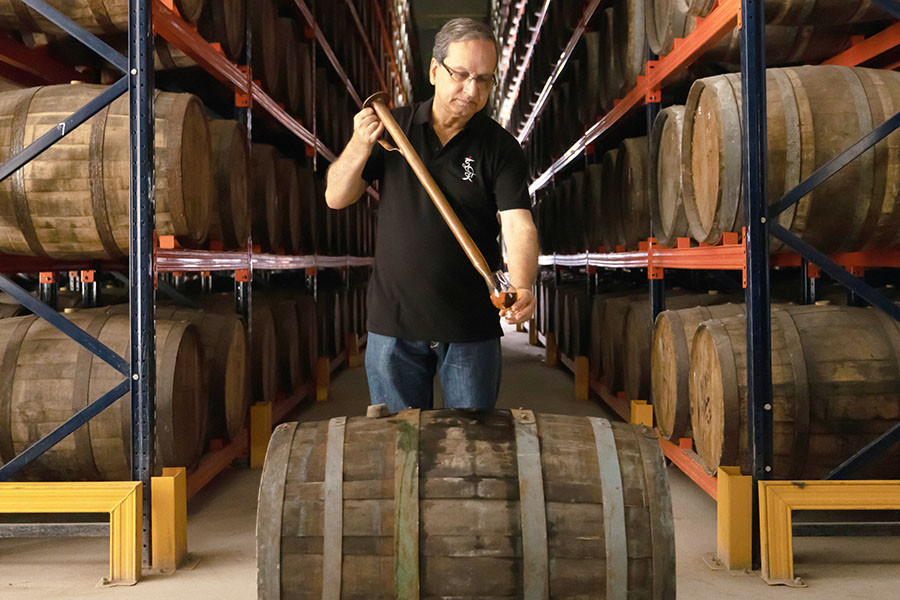(October 17, 2023) What do weddings, office parties, and festive celebrations in India have in common? Well, you’ll often find a variety of imported alcoholic beverages at these gatherings. While India has a rich history of traditional drinks like madira, somras, and āsava, we tend to be more familiar with scotch, Bacardi, Absolut and Bombay Sapphire. However, one man is changing that scene. Meet master blender Surrinder Kumar, known for putting Indian single malt whiskies on the global stage. His latest creation, Indri whisky, recently made India proud at the 2023 Whiskies of the World Awards. After rigorous blind tastings over several rounds, it secured the prestigious ‘Best in Show, Double Gold’ award. Competing against hundreds of international brands, including Scotch, Bourbon, Canadian, Australian, and British single malts, Indri emerged victorious at one of the world’s largest whisky-tasting competitions.

“What fascinates me is to see how Indian single malts have been soaring with a remarkable 37 percent growth over the past six years,” shares the master blender as he connects with Global Indian, “In contrast, imported single malts, while still performing well, have had a more moderate growth rate of 13 percent during the same period. Looking ahead, with a projected annual growth rate of 30 percent, it’s clear that both Indian and imported single malt sales are poised to maintain their upward trajectory. Given this promising outlook, my perspective on the future of single malts in India is undeniably optimistic.”
The road less travelled
Born and brought up in the beautiful state of Jammu and Kashmir, Kumar’s first job was in the state civil services. But, destiny had other plans for him. “I got that job soon after my graduation, but my interests lay somewhere else. So, after serving there for a few years I decided to move to other things,” says the master blender. In 1984, Kumar was selected at the Central Food Technological Research Institute (CFTRI), located in Mysore, which turned out to be a complete game-changer for him.

“I consider CFTRI to be one of the best places for learning about food technology in Southeast Asia. My time there gave me lots of knowledge and skills that helped me explore many different opportunities. I learned a lot about the science and methods behind making drinks, which is super important in the complex art of blending whisky. It’s all about combining science and creativity,” he shares.
After finishing his course, he moved to Bengaluru, where his brother worked. While he had a job in hand, he was a bit confused about where to join. “It was Sharad Dravid, cricketer Rahul Dravid, who helped at the time,” the master blender says, “He was working at a senior position at Kissan (an HUL brand), my brother took me to him and he suggested that I joined the Central Distilleries & Breweries.”

Talking about his time there, Kumar shares, “It was a big moment in my career because working at such a respected distillery gave me a chance to gain a ton of valuable experience and make a real impact on making spirits and drinks. My senior there allowed me to dabble and work in various departments. It’s been a major influence on the path my career has taken. Now, I’ve spent more than 35 years in this profession, and it’s been an amazing journey.”
Tasting success
About a year after joining the Central Distilleries & Breweries, the master blender got an opportunity to work at the Amrut Distilleries Ltd – which was still a small company back then. “When my manager got to know about this offer, he wasn’t so sure about it. It is a big brand now, but not many people knew about Amrut back in 1987. So, he said that he would send me for a conference to Bengaluru, and during that trip I could go to Amrut’s office and check out the place. And yet again, it was Mr. Dravid who suggested that I join Amrut. And so, I spend the next 19 years of my life working there,” shares the master blender, who eventually took Amrut to new heights.
In about two decades that he spent at the company, it bagged several awards -including their single malt Amrut ‘Fusion’ being named World Whisky of the Year at the Malt Advocate Whisky Awards in February 2011. “I think it was the same year that I won the Distiller of the Year. My experience at Amrut taught me a lot, it was also the first time that I started working on making a single malt whisky. Making a blend is not a one-day job, one has to plan everything – from the grains, to the water, and casks. We took a little bit of time to figure out everything at Amrut, but when the whisky was ready the world loved it,” shared the master blender.
The malting revolution
Over the last few years, the Indian alco-bev industry has seen a meteoric rise – not only in terms of the brands but also the market and its worth. But still, very few Indian brands have made it as big in the international market as Piccadily Distilleries’ Indri. He says, “I think is that Indri-Trini is India’s pioneering triple-cask single malt, which means that the whisky undergoes maturation in three distinct cask types – ex-bourbon, ex-French wine, and PX Sherry – crafting a truly exceptional flavour profile. The selection of these unique barrels was meticulously orchestrated to elevate the whisky’s inherent fruity and vanilla notes while introducing a subtle interplay of spices and a nutty undertone. A silky-smooth, deep amber elixir, Indri-Trini tantalises the palate with hints of caramelised pineapple, vanilla, black tea, raisins, and honey, leaving a lingering, sweet, and fruity finish that entices the senses.”

But, what is the process of making this whisky? The master blender explains, “I closely collaborate with the brand to ensure a smooth production process from beginning to end. This involves overseeing operations at the malt plant and making sure the new make passes sensory evaluations, which are crucial for maintaining the quality and character of the spirits. Additionally, I get to do barrel sampling for whisky blends and single malts on blending day, which is an exciting task. This lets me assess how the spirits are maturing, their flavors, and overall quality, which is essential for creating well-balanced single malts. Even after all these years in the industry, I still thoroughly enjoy the process.”
As we come to the close of the interview, the master blender tells me that he is quite positive about the future of single malts in India. “The Indian whisky industry is booming, thanks to its creative products that are catching the interest of whisky lovers and pulling them into this category,” he says, adding, “In 2022 alone, Indian single malts did really well, selling just over two million cases of nine liters each. That’s an impressive 18 percent growth in a year. I expect this growth to go even higher, possibly reaching nearly 30 percent annually in the coming years.”
- Follow Surrinder Kumar on LinkedIn





Cheers.